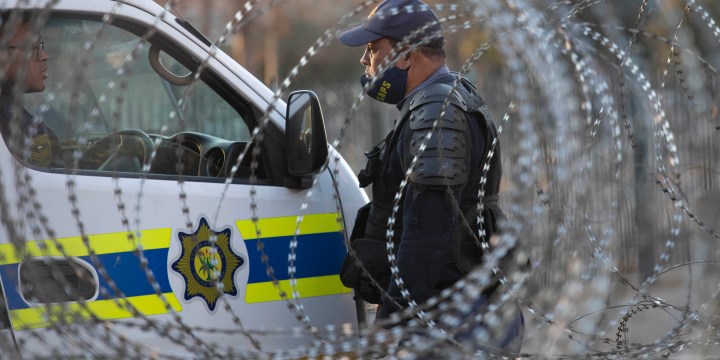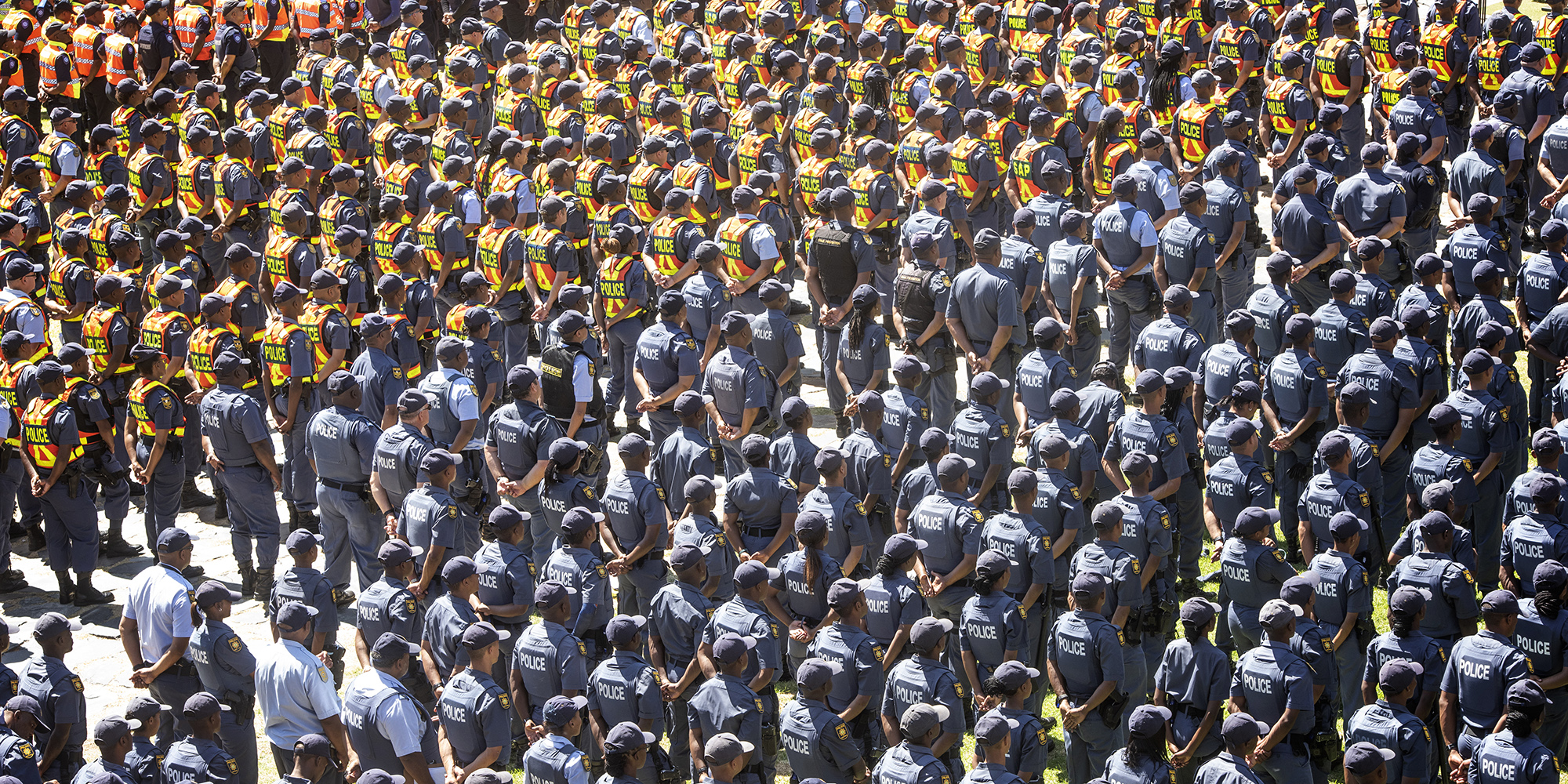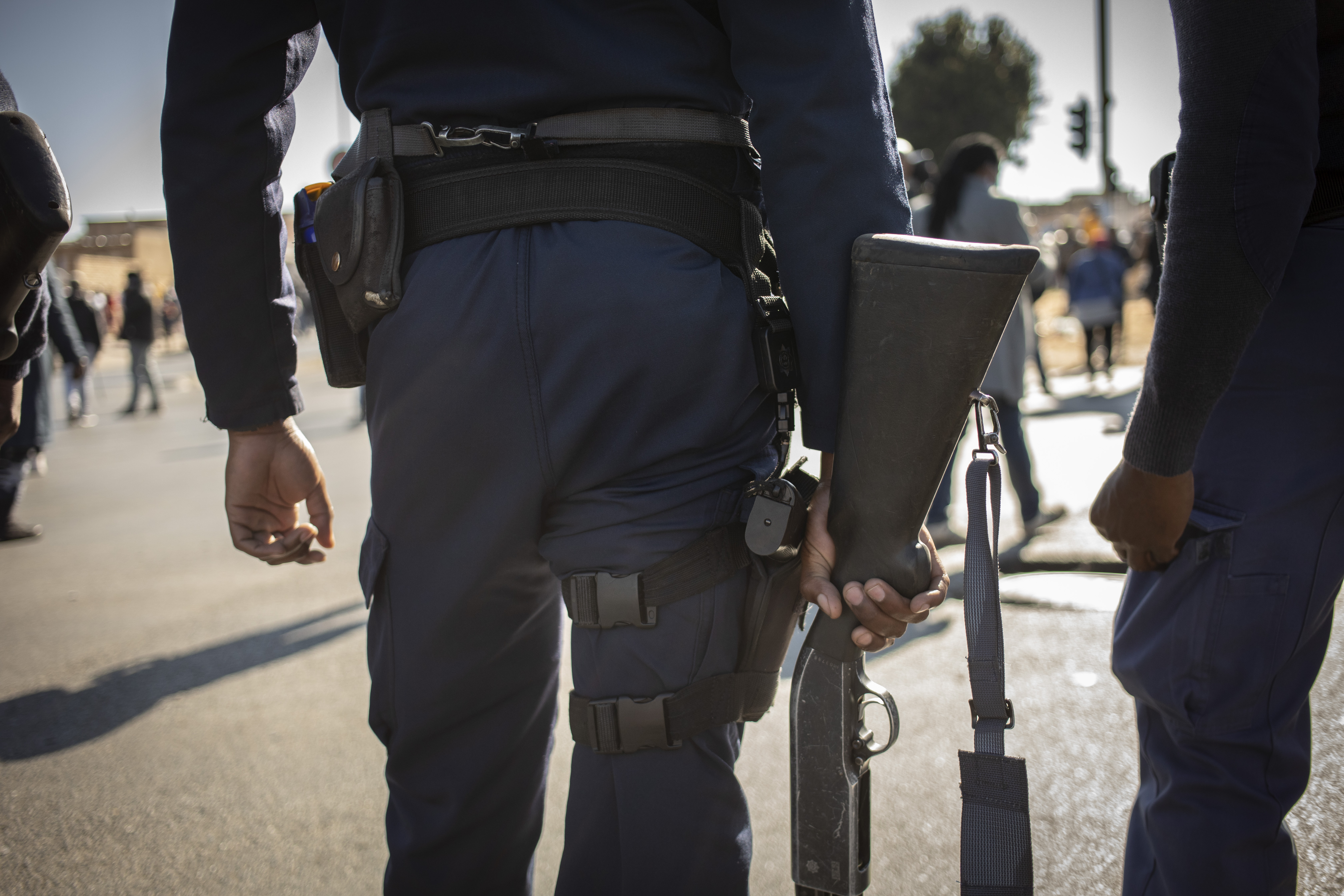BLUEPRINT FOR RECOVERY 2024
Part 4: Police and security — moving away from elite pampering to actually fighting crime

In 2017, Pravin Gordhan urged South Africa to ‘join the dots’ between corruption and the Zuma administration. John Matisonn joins those dots in this eight-part series. In this instalment, he spells out the immediate and the longer-term action that is required to fix the security and prosecution establishments.
Also read Part 1, Part 2 and Part 3.
Nothing tells the story of priorities gone haywire so well as a comparison of the budget allocations for VIP protection versus the budget for the Hawks.
You guessed it: to protect about 200 VIPs the budget is R3.76-billion. To protect 60 million South Africans against priority crimes undermining the state, citizen safety and the economy? R2.2-billion will do.
That means that the Directorate for Priority Crime Investigations (also known as the Hawks), responsible for stopping rampant corruption, organised crime, drug and people trafficking and more gets 58.5% of what is spent to protect about 200 elite politicians.
The justice system embodies the full suite of the decay of the last 15 years or so. It also embodies all the risks: bad men and women with guns and spy gadgets can torpedo critical reforms before they begin. This possibility must be nipped in the bud so the other reforms get traction.
Immediate and far-reaching action is required in the security and prosecution establishments. That means some things must be done on day one, some in the first weeks, and the rest strategically sequenced over the long haul.
A rough outline of the sequenced programme might look something like this.
Day One:
- Close down the State Security Agency. It is so compromised that the bad more than outweighs any good it does. A new intelligence service will have to be established from the ground up, based on constitutional guidelines and national security requirements, with no political role;
- A new police minister needs to be sufficiently familiar with the senior police hierarchy to make substantial changes at the top level on entering office. SAPS requires new leadership to be held accountable for increasing successful and timely investigations. Analysts familiar with the senior police know far more qualified senior police, including doctoral graduates, black and white, both still in the police and those who left in despair, who have been sidelined and are capable of coming in at the top to reinvigorate the force;
- The resistance to recruiting private sector advocates and attorneys to assist in prosecutions must end immediately. The Zondo Commission demonstrated their value. They are essential to conduct sufficient speedy, effective prosecutions and restore damaged public faith in the justice system. They will mentor less experienced lawyers on their teams as they prosecute high-profile crimes; and
- The Independent Police Investigation Department (Ipid) must be made independent of the Police Commissioner and prioritise investigating top-level police to bring criminals to justice.
And further down the line…
The next top priority item is the creation of an independent, multidisciplinary, Scorpions-style, properly funded, high-priority crimes unit to replace the Hawks. Its mandate will include high-level corruption, commercial crime and organised crime, and it needs to be constitutionally protected from political interference.
Currently, this is being done by the Hawks, the unit in the South African Police Service which investigates priority crimes such as cash-in-transit robberies, theft of fuel from Transnet pipelines, drug trafficking, human trafficking, corruption, commercial crimes, organised crimes, cybercrime and money laundering.
The reasons it must be replaced are obvious to most observers. The Hawks replaced the Scorpions as a result of a 2007 ANC decision, to be less independent. The Scorpions had been widely admired for their independence and success, which ignited fear in well-connected politicians.
Since it was so easily disbanded, support for entrenching it in the constitution as a Chapter Nine body whose independence is constitutionally protected has gained ground.
The DA’s Glynnis Breytenbach has submitted a private member’s bill proposing the unit be a Chapter Nine body under the Constitution, requiring a constitutional amendment supported by two-thirds of the National Assembly and six of the nine provinces in the Ncop. This approach has long been championed by Advocate Paul Hoffman’s Accountability Now, but the ANC appears to have gone for independence without constitutional entrenchment. We’ll see.
Obviously, it needs a bigger budget than the Hawks, an increase perhaps most easily taken from a deservedly diminished blue light brigade of the VIP protection unit. Resourcing it properly is essential because without its effectiveness, we will not get our country back.
Recent incidents show the obvious excess of a VIP protection unit out of control. Besides the shocking video of violence on civilians that the country has seen, the Warsaw airport incident involved 100 security members of the presidential guarding team. An ambassador of a country larger than ours stationed in Pretoria told me the normal number they use is four. Remember, a head of state’s protection is the responsibility of the host government. The visiting principal’s own guards are there for liaison and personal emergencies.
Next, the justice system needs a massive programme to revitalise almost every corner of its vast bureaucracy.
Court buildings are in advanced disrepair, which means the relationship between the judiciary and the Public Works Department has broken down. (This is sometimes called the problem of “silos” in government: practices have arisen that prohibit direct interaction between departments without going through often obstructionist ministers or directors-general.)
The Supreme Court of Appeal’s Judge President needs a bucket to stop the water dripping through roof leaks in her office, and a Potchefstroom court roof recently collapsed, leaving court proceedings to be conducted outside under a tree.
Instead of sitting their full day, many courts sit for little more than an hour a day, which means discipline and authority have broken down. Judgments routinely take a year or more to be handed down, which means the Judicial Services Commission lacks diligence.

The author believes that the intelligence services, police, prosecuting authority and other crime fighters are broken, requiring fundamental reform. (Photo: Gallo Images / Brenton Geach)
The percentage of crimes that successfully lead to arrests, prosecutions, convictions and sentences is abysmal. The apartheid-era practice of announcing a flourish of arrests after high-profile crimes, which silently disappear into releases without prosecutions seems to flourish in post-apartheid policing.
The range of fixes needed is extensive. The backlog of cases must be eliminated, victims need better support, as do whistle-blowers.
Read more in Daily Maverick: Law is weaponised against vulnerable whistle-blowers, say experts
The fabric of the institutions — the pipeline of detectives, prosecutors, interpreters, specialist police, senior officers — has been so disrupted that the loss of skills portends an even worse picture in the future.
The intelligence services, police, prosecuting authority and other crime fighters are broken, requiring fundamental reform. Only South Africa’s highest courts still operate with adequate expertise, resources and integrity.
Reversing the decline will be a Herculean task, but the skills still exist in South Africa to meet the challenge. All police need re-evaluation as part of a programme to professionalise. A culture of mentorship by the most experienced as part of a pipeline of succession to retain skills has to be restored.
Skills retention, skills recovery, better training for judges, an overhaul of prisons that will likely include replacing some — these are just some of the reforms needed.
Specialised police units will need to be formed immediately to prioritise types of crimes, from Eskom criminality to gender-based violence. Containing crime at a limited number of electricity plants where extensive criminal activity is compromising the country’s economy and citizens’ livelihoods must be a top national priority.

The author argues that the Independent Police Investigation Department must be made independent of the Police Commissioner. (Photo: EPA-EFE/Kim Ludbrook)
These police need to have investigative experience and work with prosecutors dedicated to rooting out Eskom criminals. If state lawyers are in short supply, private-sector advocates and attorneys need to be brought in on an urgent basis to conduct prosecutions.
A suggestion has been made that a percentage of cash recovery should go to investigative journalism, as the branch of society that has proved most effective and enduring at uncovering malfeasance.
Responsibility for providing crime statistics must be independent of police, which has a conflict of interest. Stats-SA might be the simplest place for crime stats.
Police use of new technology needs to be upgraded urgently. There is insufficient up-to-date use of drones, dashcams, bodycams, shot-detection audio technology and CCTV cameras to cut crime activity on South Africa’s streets. Artificial Intelligence (AI) is also a game-changer in anticipating crime.
Intelligence legislation needs reform. Two apartheid-era intelligence acts (1969 and 1978) must be repealed, and the Protection of Information Act of 2013 modernised.
Private sector vs devolution to cities and provinces?
Finally, government needs a long-term view about the two main new initiatives brought about outside the national government as a result of its failures — the private sector takeover of key police functions, and pressure from provincial and municipal authorities to devolve some policing powers to them.
Once the private sector has helped restore policing to proper functionality, can the national government do it all on its own? That could take a long time, even with the best of intentions. Meanwhile, should the private sector stay involved, or should provincial and municipal governments increase their roles permanently?
In June 2023 business and government agreed on a partnership to tackle ongoing dysfunctional state activities. To assist government in tackling crime and corruption, which business leaders said costs the economy up to a trillion rand a year, they took on three work streams.
This was a concession for the government, which had opposed the involvement of both the private sector and the devolution of powers to lower tiers of government. Clearly, the decision to partner with business was an admission that the national government was failing.
In the crime and justice section of this agreement, business was mandated to bring expertise to these areas:
- Help capacitate the NPA. This is expected to mean connecting the NPA to specialist skills in the private sector, including advocates and attorneys, forensic accountants and others needed to prosecute complex cases. This offer has been available for a long time and should have been accepted when it was made, with the obvious rules to protect prosecutors’ independence;
- Business has committed to building a state-of-the-art forensics laboratory. Huge backlogs at existing state forensics laboratories have severely hampered investigations and prosecutions. This new facility will use AI, data analysis and smart computers to track illicit funds. It will be a long overdue modernisation;
- Business Against Crime, a division of Business Leadership South Africa, will for the first time pool private sector intelligence — including from the Minerals Council and the Banking Association — that render specialised services. This will give it the information to disrupt organised criminal syndicates and chase down their illicit supply chains. Business will have to coordinate with the police and NPA to ensure this leads to successful arrests and prosecutions. This is an expansion of Business Against Crime’s focus, from petty theft to dealing with syndicates and organised crime; and
- Business will help the police to capacitate and train staff at call centres and police stations.
The push for devolution of some policing power to local government has been led by the DA in the Western Cape where city and provincial government have been more effective at using the resources they have. But there are pockets of support among some ANC officials in local government.
Read more in Daily Maverick: Devolution of policing powers in SA municipalities could provide greater scope for combatting crime
This has led to some hope that Parliament will approve measures to devolve control of policing to provinces and towns. There are clearly advantages to having control of law enforcement by people well acquainted with local conditions.
What should be the long-term vision? Surely the private sector should not be doing the state’s work? Over time, private sector influence is bound to risk advantaging influential business interests over the less influential. Both sides should be relieved when it’s no longer necessary because the government has once again capacitated itself.
On the other hand, there is nothing in principle wrong with provincial and local branches of the state taking over some aspects of policing. This is done successfully in many countries. Canada offers an excellent model, and the national government will have its plate full to set all the above back on course.
The days of a common purpose in government to solve problems and deliver services optimally have long passed. Common purpose in service to South Africans has to return, whoever is president or minister. DM
Next: Foreign policy after Ukraine and the BRICS Summit.

















Is there nothing the ANC government hasn’t corrupted or destroyed in this country? Oh yes, I forgot there is one – their personal fortunes.
I just can’t read this news anymore. The outcome is obvious – a failed South Africa, but as citizens we need to know the cause so we can cauterise it. Is it stupidity, or laziness, or greed, or culture, or arrogance? Or all of these?
Great article John. You have shown us that a seemingly intractable problem can be fixed in a structured way by people brave enough and willing to do the work. We can’t keep lamenting how bad the ANC is – we all know it by now – and too few of their supporters read Maverick to make a difference. It’s time to stop moaning, get out of the echo chamber, and find out how we can help on on individual basis.
Well, a fascinating paper indeed. For even one of those changes to take effect – a completely new government will be required, not a coalition but too heavy ruling party. The ANC is so entrenched and would be very hard to shift. However, there is hope, and we are seeing a swing, but the numbers need to keep rising.
One would be hard pressed not to notice the activity or should I say illusion of actions taken to fix what’s broke. Definitely in the buy back phase now. There will be millions with stars in their eyes and fists at the ready to whitewash and stack the votes. Perhaps we should rather pray and keep our mouths shut so that voting really becomes a personal matter with a piece of paper.
One more thing – I hope that colouring the pinkie nail isn’t going to happen with the SA vote, it comes off very easily with mentholated spirits.
Sounds good doesn’t it? No chance in hell of change because the ANC does not want things to improve. As a totally debauched corrupt organisation templated with the Soviet NDR ideology all they are interested in is becoming a one-party state and then bleeding the country dry. Good plans as above are wasted on them.
Agree 100 %,but for this to happen the ancer must go,totally incapable
Ever thought of running for President? We need people like you that can identify our problems, provide solutions and make sure they are implemented!
Good sense, but how about changing the framing? From ‘fighting crime’ to ‘creating public safety’. What different possibilities open up then? The National Development Plan’s excellent chapter on policing has been under-reported on, and should be taken seriously.
Good article.
Based on the political murders reported, the ANC leadership and oligarchy mostly need protection from each other. That shouldn’t be the tax-payers’ problem.